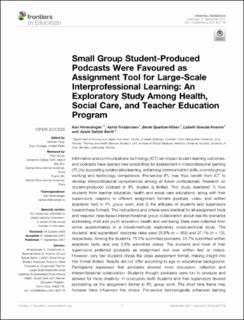| dc.contributor.author | Almendingen, Kari | |
| dc.contributor.author | Torbjørnsen, Astrid | |
| dc.contributor.author | Nilsen, Bente | |
| dc.contributor.author | Kvarme, Lisbeth Gravdal | |
| dc.contributor.author | Saltyte Benth, Jurate | |
| dc.date.accessioned | 2022-02-17T09:47:08Z | |
| dc.date.available | 2022-02-17T09:47:08Z | |
| dc.date.created | 2021-09-01T13:50:44Z | |
| dc.date.issued | 2021-09-17 | |
| dc.identifier.citation | Frontiers in Education. 2021, 6 . | en_US |
| dc.identifier.issn | 2504-284X | |
| dc.identifier.uri | https://hdl.handle.net/11250/2979586 | |
| dc.description.abstract | Information and communications technology (ICT) can impact student learning outcomes, and podcasts have opened new possibilities for assessment in interprofessional learning (IPL) by supporting collaborative learning, enhancing communication skills, promote group working and technology competence. Pre-service IPL may thus benefit from ICT to develop interprofessional competencies among all future professionals. Research on student-produced podcast in IPL studies is limited. This study examined 1) how students from teacher education, health and social care educations, along with their supervisors, respond to different assignment formats (podcast, video, and written academic text) in IPL group work, and 2) the attitudes of students and supervisors toward these formats. The instructions and criteria were identical for all assignment tools and required case-based interprofessional group collaboration about real-life scenarios addressing child and youth education, health and well-being. Data were collected from online questionnaires in a mixed-methods exploratory cross-sectional study. The students’ and supervisors’ response rates were 25.8% (n = 363) and 37.1% (n = 13), respectively. Among the students, 75.2% submitted podcasts, 23.7% submitted written academic texts, and only 0.8% submitted videos. The students and most of their supervisors preferred podcasts as assignment tool over written text or videos. However, very few students chose the video assessment format, making insight into this format limited. Results did not differ according to age or educational background. Participants expressed that podcasts allowed more discussion, reflection and interprofessional collaboration. Students thought podcasts were fun to produce and allowed for more creativity. In conclusion, both students and their supervisors favored podcasting as the assignment format in IPL group work. The short time frame may however have influenced this choice. Pre-service technologically enhanced learning cannot replace practice-based learning. However, submission of case-based podcast assignments could prepare students for interprofessional collaboration about complex real-life scenarios. | en_US |
| dc.description.sponsorship | This study was funded by internal funding from OsloMet. | en_US |
| dc.language.iso | eng | en_US |
| dc.publisher | Frontiers Media | en_US |
| dc.relation.ispartofseries | Frontiers in Education;September 2021 | Volume 6 | Article 622716 | |
| dc.rights | Navngivelse 4.0 Internasjonal | * |
| dc.rights.uri | http://creativecommons.org/licenses/by/4.0/deed.no | * |
| dc.subject | Podcasts | en_US |
| dc.subject | Videos | en_US |
| dc.subject | Assignments | en_US |
| dc.subject | Assessments | en_US |
| dc.subject | Blended learning | en_US |
| dc.subject | Interprofessional learning | en_US |
| dc.subject | Case-based learning | en_US |
| dc.title | Small group student-produced podcasts were favoured as assignment tool for large-scale interprofessional learning: An exploratory study among health, social care, and teacher education program | en_US |
| dc.type | Peer reviewed | en_US |
| dc.type | Journal article | en_US |
| dc.description.version | publishedVersion | en_US |
| dc.rights.holder | © 2021 Almendingen, Torbjørnsen, Sparboe-Nilsen, Kvarme and Saltyte Benth | en_US |
| dc.source.articlenumber | 622716 | en_US |
| cristin.ispublished | true | |
| cristin.fulltext | original | |
| cristin.qualitycode | 1 | |
| dc.identifier.doi | https://doi.org/10.3389/feduc.2021.622716 | |
| dc.identifier.cristin | 1930496 | |
| dc.source.journal | Frontiers in Education | en_US |
| dc.source.volume | 6 | en_US |
| dc.source.pagenumber | 10 | en_US |

